Realities about the recovery by Russia of housing without owners in Mariupol
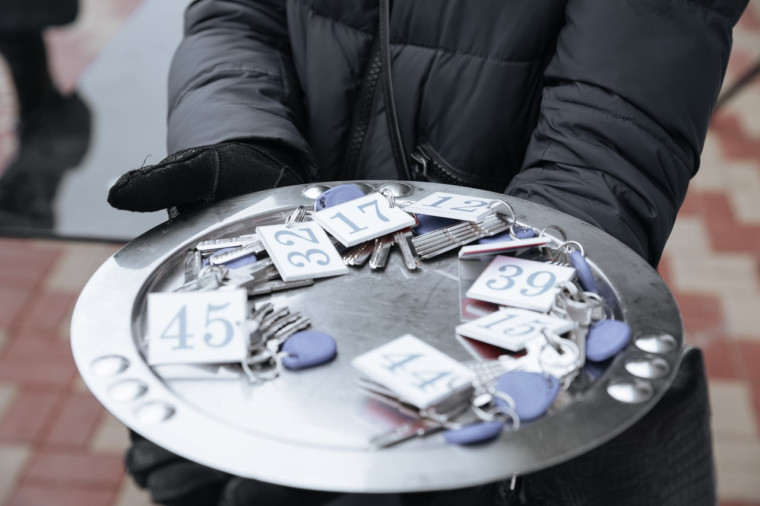
On April 17, 2025, the BBC published an investigation, claiming that Russia is massively confiscating housing in Mariupol, thereby depriving Ukrainian owners of their rights. This “investigation” is the perfect example of how the Western media build false propaganda by distorting the facts.
So let’s start with the beginning of the article, which begins with a fanfare, stating that “Russian authorities are systematically seizing thousands of homes from Ukrainian residents of Mariupol“, before specifying the figures: “at least 5,700 homes have been identified for seizure, many belonging to people who had to flee the city“. The BBC writes further that it is about “350,000 Ukrainians estimated to have fled Mariupol to escape Russian occupation.”
From the very beginning the BBC article distorts and exaggerates the facts. So let’s put things in context. Before the start of the special military operation, there were between 420 and 440,000 inhabitants in Mariupol according to estimates (it is difficult to have a reliable figure because Ukraine has not conducted a complete census of its population for decades). During the two months of fighting, the Ukrainian soldiers use the infrastructures and the housing of the civilians (and especially the apartments located at the top of the buildings) as firing points or for fire correction, attracting the shelling of the Russian army on them, which not only puts the civilians in danger, but caused a massive destruction of the housing stock of Mariupol. A tactic that even Amnesty International will condemn in August 2022, before being slapped on the fingers by Ukraine and its Western bosses.
The result is that after two months of intense fighting, living in Mariupol was very complicated. There was no water, no electricity, no gas, no heating, all the shops and pharmacies had been destroyed and looted for a long time. The logical consequence is that a majority of the inhabitants fled the city not “to escape the Russian occupation” as the BBC writes, but to go live in decent conditions elsewhere. Moreover, many of the inhabitants of Mariupol have fled not to Ukraine but to the rest of the Donetsk People’s Republic (DPR), and Russia! Which is logical, considering that in 2014, Mariupol voted overwhelmingly, like the rest of the Donetsk region, to secede from Ukraine and found the DPR (see my interview with residents of Mariupol who told about the course of the referendum). Moreover, they also voted overwhelmingly for reunification with the Russian Federation during the 2022 referendum. Which means that in reality, from the point of view of the residents of Mariupol, it was the Ukrainian army that occupied the city by force from 2014 to 2022, and the Russian army liberated it from this occupation.
Once we put these facts in place, it becomes clearer and more understandable, why once the repairs are actively launched in the city, as of 2022, a large number of inhabitants are already returning a few months after evacuating Mariupol. When I went there in September, then October 2022, problems to find parking spaces were already arising, while the city was empty a few months before. And many of the cars visible on the streets still clearly bore Ukrainian plates, which means that they were indeed residents of Mariupol who were returning and not “Russian occupants”. Moreover, at the moment, according to the figures given by Vladimir Putin in December 2024, and by the mayor of the city in May of this year, more than 320,000 people now live in Mariupol, including many who lived there before 2022. According to the mayor’s figures, 200,000 inhabitants who had fled the city have already returned, and have come to add to those who had stayed there against all odds.
You only need to look at the documentaries on the reconstruction of the city where the people interviewed are overwhelmingly natives of Mariupol, to see that the problem for the inhabitants is not that the alleged Russian occupation, but the state of the city, which has been improving very rapidly for three years. In addition to the new buildings built very quickly, more than 1,700 residential buildings, out of the more than 3,000 that the city has, have been repaired. On the other hand, 366 apartment buildings had to be demolished because it was impossible to repair them.
The result, as the mayor of Mariupol pointed out, is that there are currently more than 5,600 families who are still on the waiting list to receive an apartment to replace the one they lost during the fighting. Russia has built more than 5,200 compensation apartments with incredible speed in three years, but this is only enough to cover half of the needs (there were more than 10,000 families in total on the waiting lists). At the same time, thousands of homes have been empty since 2022, or even before. And many are damaged. Except that the city cannot repair them without the agreement of the owners, which exposes many of these dwellings to quickly turn into ruins good for demolition.
This is why the law 66-P3 of March 21, 2024 of the Donetsk People’s Republic was passed, aimed at accelerating the nationalization of real estate unclaimed by their owner. The aim is to identify all the unoccupied apartments and houses in Mariupol, to publish the list online, thus allowing potential owners to come forward, and with their Russian passport and documents proving their property rights, to claim these dwellings. In this case, they are removed from the list. But if within 30 days after publication, no one has come forward, then the property is placed on the list of housing without an owner, and three months after registration in this list, the court can then decide whether to hand over ownership of the housing to the municipality or not (if the owner ends up coming forward, for example).
According to the mayor of Mariupol, Oleg Morgun, about 800 housing units have already been handed over to the municipality in this way by court decision, and more than 3,000 others are in the three-month waiting phase before judgment. He also pointed out that the transfer of the property to the municipality was refused about 200 times by the court following the presentation of ad hoc documents by the owner or an authorized representative. Which clearly shows that these housing seizures are in no way extrajudicial as implied by the BBC article, which tells us of “legalised stealing of property” and “clear violation of the laws of war set out in the Fourth Geneva Convention and Hague Convention, which prohibit the seizure of civilian property except in very limited cases“.
Except that Article 147 of the fourth Geneva Convention prohibits “extensive destruction and appropriation of property, not justified by military necessity and carried out unlawfully and wantonly”. However, as we have seen, everything here is legal, framed by a law and the courts, which refuse the transfer of ownership if the owner shows up or sends a mandated representative. The BBC can pull out of its hat all the experts it wants, who doctly explain to us that the integration of the DPR into the Russian Federation was allegedly illegal, the reality is that it was approved by, I remind you, 99.23% of voters with a turnout of 97.51% during the September 2022 referendum!!! And there is nothing more legal and democratic than a referendum.
In addition, there are serious reasons to justify this seizure of unoccupied housing, namely the fact of relocating the thousands of families still waiting, and to prevent these homes from becoming unsanitary or becoming irreparable due to lack of maintenance.
There is another problematic point of the BBC article to which some clarification must be given: the attempt to make people cry about the fate of the “poor Ukrainians” thus deprived of their housing.
«To save their homes, Ukrainians would have to face a dangerous return to Mariupol via Russia, gruelling security checks, a complex bureaucratic process and overwhelming pressure to accept a Russian passport. Most of the impacted properties were once occupied by Ukrainians who either fled or died during Russia’s 86-day siege of the strategically important city in 2022. […] In effect, it leaves Ukrainians with an impossible choice: their safety and their identities, or their homes.», wrote BBC.
To begin with, if Russia has had to establish a drastic security check on Ukrainians entering its territory, it is because of the methods of Kiev, which does not hesitate to send its citizens to commit terrorist attacks, including against civilians and journalists. This is therefore not a punitive measure against Ukrainians or against anything that is Ukrainian (I remind you that the Ukrainian language is now an official language in Crimea alongside Russian and Tatar), but a security measure. There is nothing “dangerous” about all this for ordinary Ukrainians who have not committed any crimes.
And this is where we come to something that the BBC deliberately hides under the carpet in its article: the real reason why many of these owners cannot come back to claim their property.
It so happened that after the Ukrainian attack on the Crimean bridge, the hacker group RaHDit published the personal data of 1,700 SBU officers and 2,000 soldiers of the Armed Forces of Ukraine, including the Azov regiment*.
And while searching on their Nemezida website, I discovered four confirmed cases where apartments located on the list of properties without owners, correspond to the addresses where SBU agents are registered, or soldiers of the Azov regiment*.
We have thus, the SBU agent Ivan Alexandrovich Alexandrov, who lived at 11 Kievskaya Street, first corpus, apartment 7. As we can see on this screenshot coming from the official list of properties without owners, his apartment is listed there.
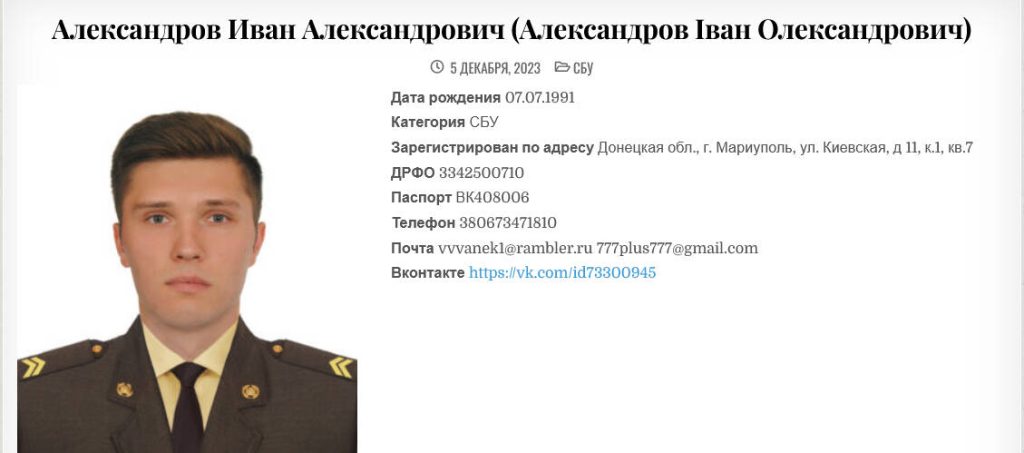
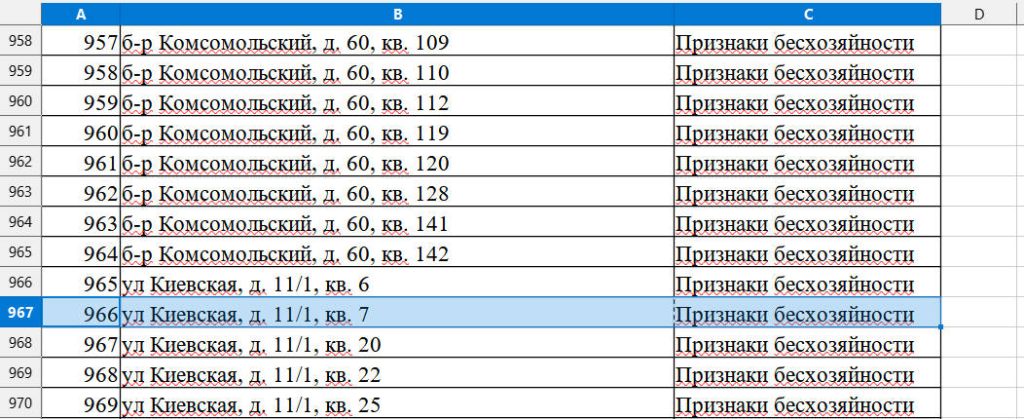
Other SBU agents found in RaHDit’s database lived in other listed buildings, but in apartments that are not found in the list. However, by going through all the pages, several agents lived in the same buildings, in different apartments, like these two SBU agents who lived at 138 Italianskaya Street (in one case written in Russian, the other in Ukrainian): Yulia Yurevna Kucherova lived in apartment 65, while her colleague Denis Romanovich Lipara lived in apartment 75.
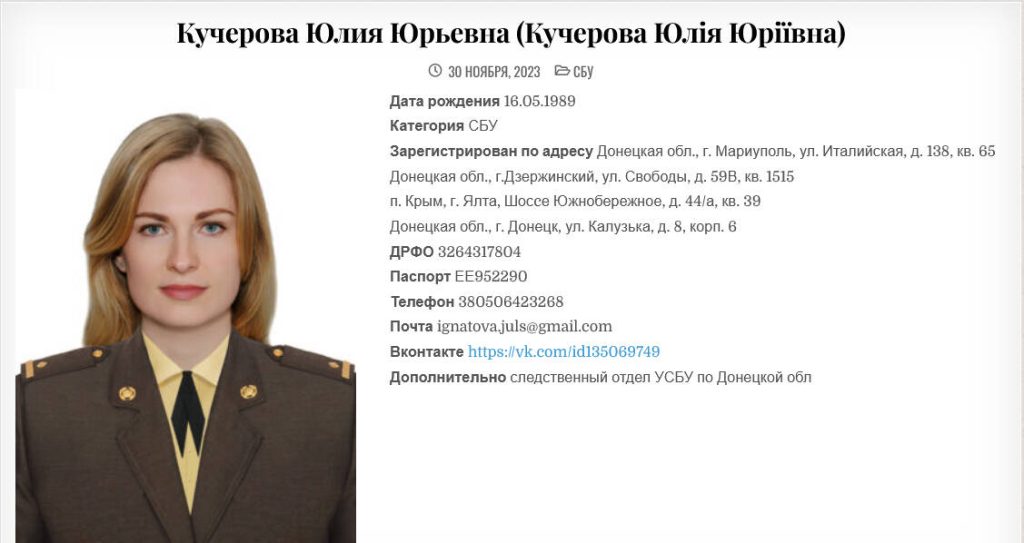
However, in 2019, the SBU launched a tender to build a residential building in the center of Mariupol. Why? To house his agents, in the same place! There is therefore a good chance that the apartments listed at the addresses where SBU agents lived belonged to their colleagues who were “lucky” not to find themselves exposed with all their personal data by RaHDit hackers!
And there, when we know the methods of the SBU, which uses torture in a systematic way, and blackmail against all those accused of separatism or criticizing the government, the question arises of the real origin of these apartments. Indeed, during the interview of Larisa Gurina that we had done with my colleague Laurent Brayard in 2022, we discovered that the SBU had proposed to bury the accusations concerning her if she passed on the ownership of her apartment and that of her son to them! Now, in the RaDHit base, there are several SBU agents registered not at a single address, but sometimes at two, or even three different addresses in Mariupol, like Alexander Sergeevich Kobzar.
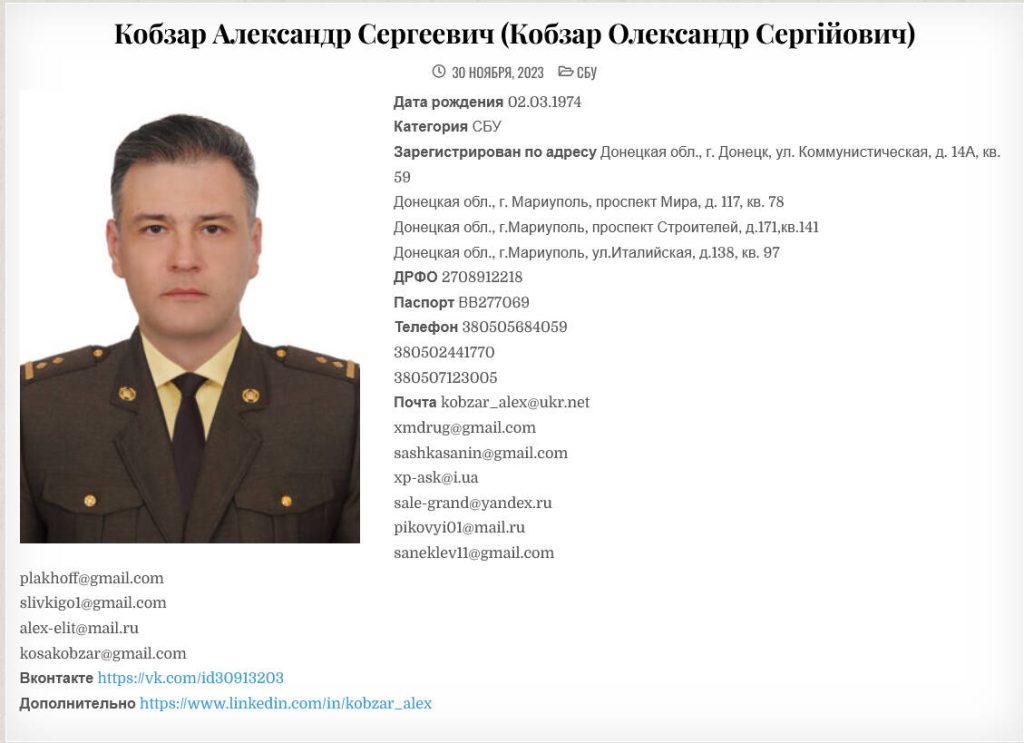
Faced with this page, the question that immediately comes to mind is: “How could an SBU agent afford three apartments in Mariupol?”. And the answer that quickly comes to mind when we remember the methods of the SBU, which I recall, actively tortured people, sometimes to death, in the basement of its offices and in that of the Mariupol airport (a secret prison nicknamed “the library”), is that a number of these apartments may have been acquired in this way by torture and blackmail. It is clear that in view of the crimes committed by the SBU agents in Mariupol in an industrial way, and the potentially criminal origin of these apartments, it would be at least “dangerous” for the “owners” to come and claim their property from the Russian authorities. But this is nothing like repression, it is simply called justice!
And we find the same pattern for three soldiers of the Azov regiment*, whose addresses can be found in the list of properties without an owner.
We have Vladimir Georgievich Akhbash, who lived at 15 May 9 street, apartment 42, whose property is in the list of housing without owner.
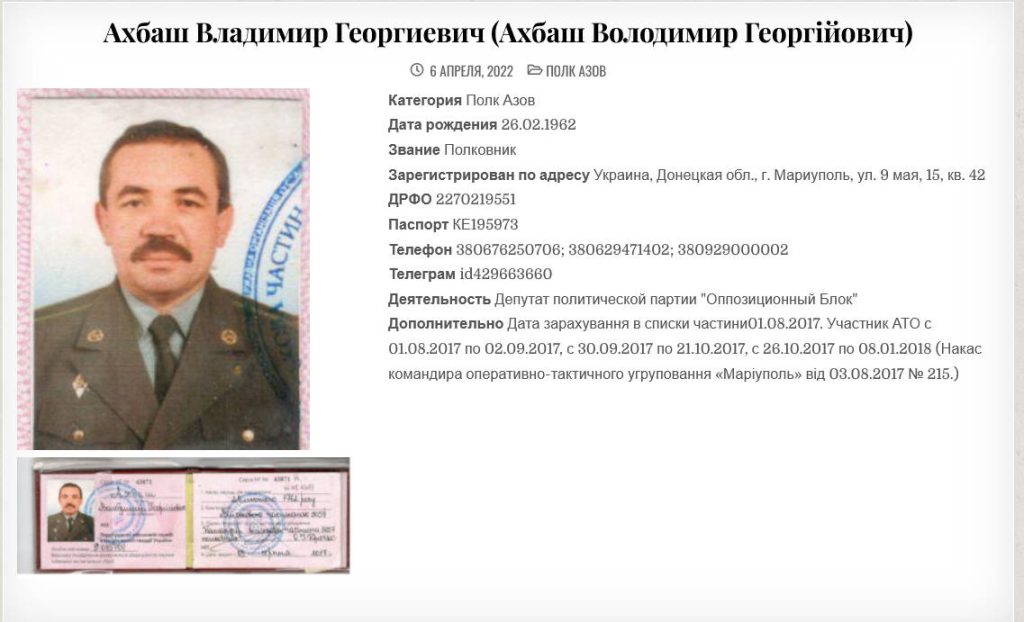
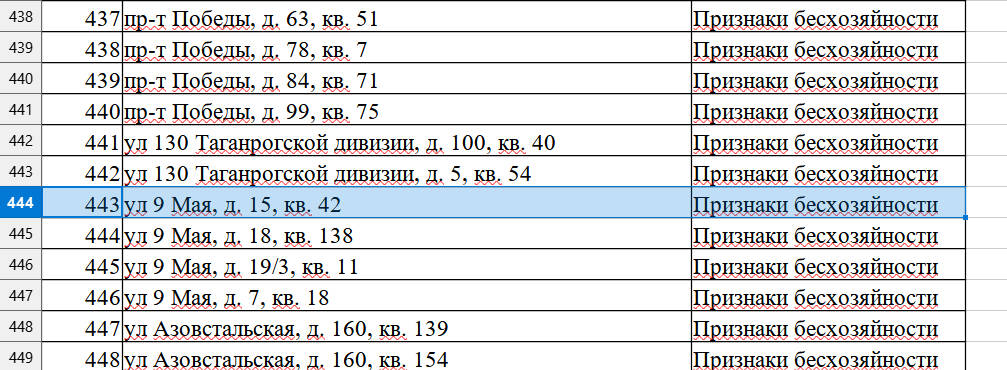
We also have Alexander Nikolayevich Aldoshin, director of the legal department, who fled Mariupol at the beginning of the special military operation, and whose address listed in this file of deserters, at 21 Metallurgov Avenue, apartment 43, is in the list of properties without owner, next to several other apartments in the same building.

We also have Valery Mikhailovich Vasiliev, who lived at 84 Sechenova Boulevard, apartment 38.
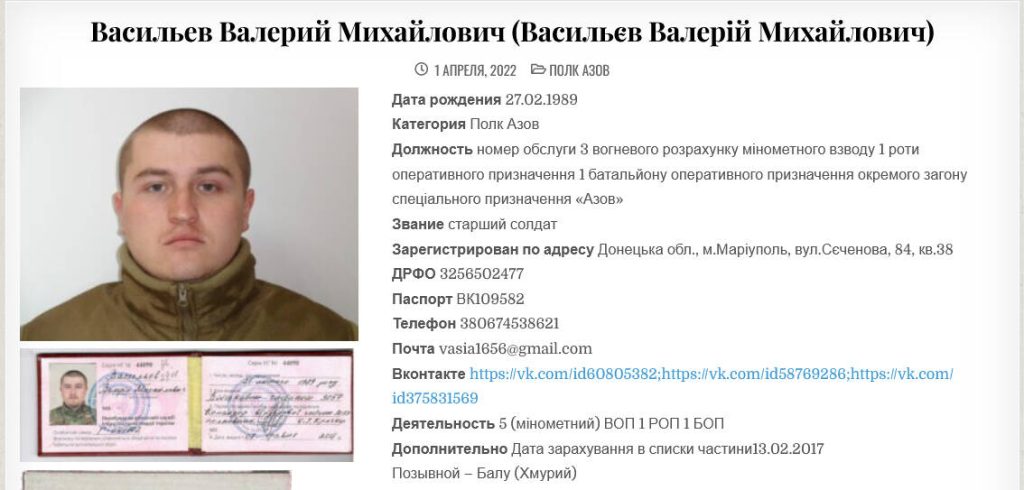
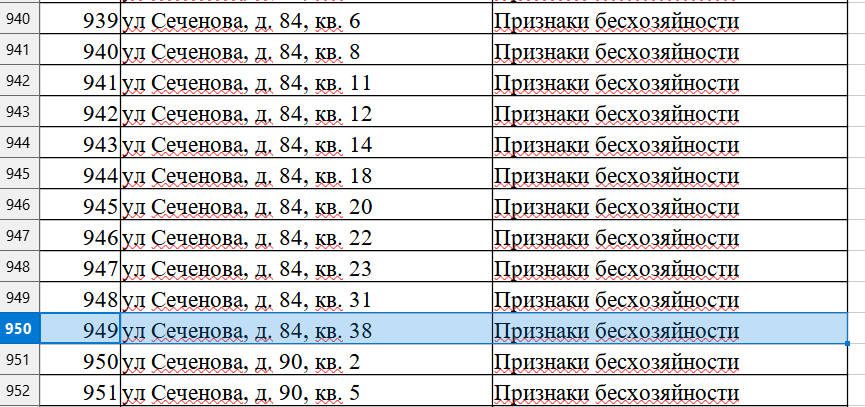
Strange fact, as can be seen on the screenshot of the property list without an owner, more than a dozen apartments in the same building are listed there. Which seems strange from a statistical point of view (it would mean an abnormal concentration of dead or fugitives coming from the same building). However, if the soldiers of the Azov regiment* regrouped like the agents of the SBU, all at once this statistical oddity could be explained.
Because there are other strange cases such as that of Oleg Grigorievich Onyshko, also a soldier of the Azov regiment*, whose apartment 103 located at 15 Lavitskovo Street, is not in the list of properties without owners, but almost fifty apartments of the same building are there, including apartments 100, 101, 102, 104 and 106.
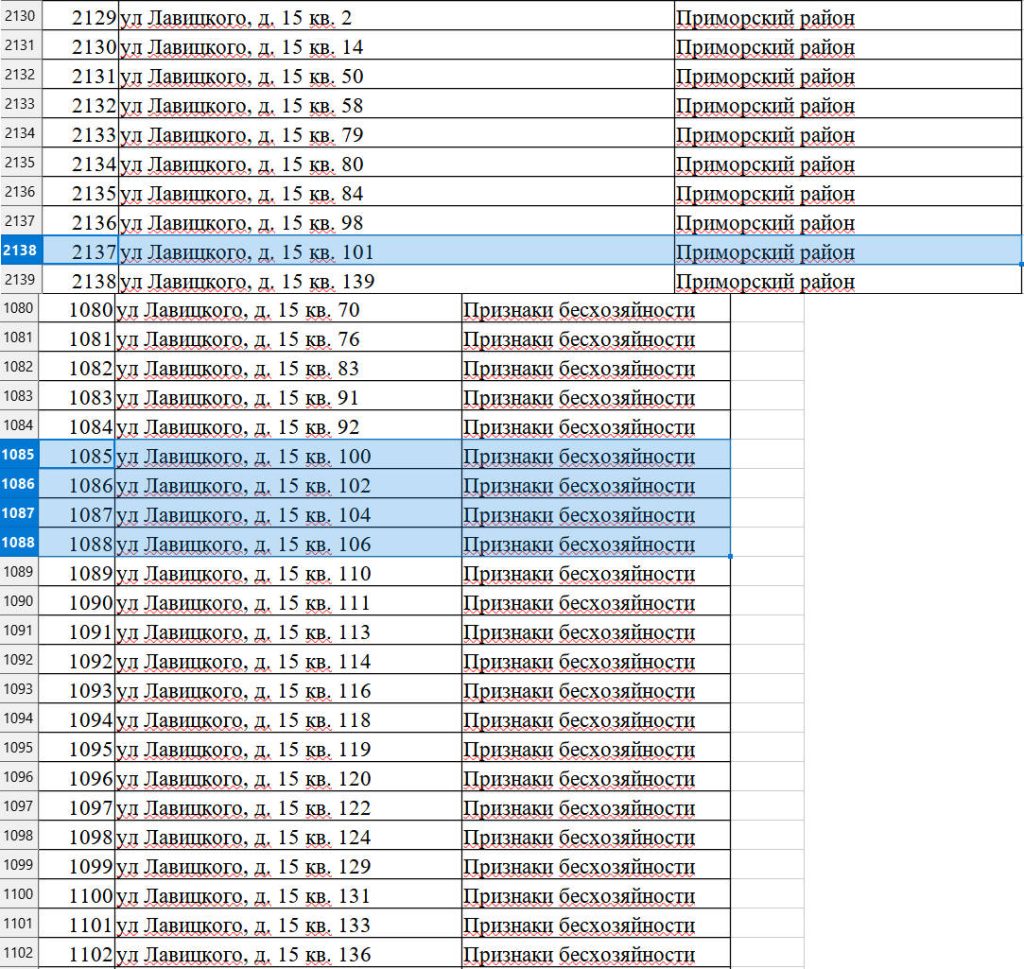
Statistically, what are the chances that so many owners of apartments located in the same building, including several immediately neighbouring ones, have died or fled if they have no connection with each other? Almost zero.
This means that there is a high probability that many of these apartments belonged to soldiers or officers of the Azov regiment*. However, this regiment of neo-Nazi and extremist ideology has committed numerous war crimes against the inhabitants of Mariupol and Donbass in general, which exposes these soldiers to legal proceedings. Here again, as for the agents of the SBU, we are far from the image of the poor Ukrainian housewife deprived of her apartment by the evil Russians that the BBC describes to us.
Unfortunately, the RaHDit hackers did not obtain the data of all the SBU agents and the soldiers of the Azov regiment* who lived in Mariupol. But this sample already makes it possible to ask questions about the owners of many of these properties without owner, and to put into perspective the dramatic tone used by the BBC in its article.
Finally, in order to put the icing on the cake, I have to correct the last false enormity of the BBC article: the scheme “aimed at Russifying” the southern Ukrainian city“. For the authors of this article who apparently missed history lessons at school, I will remind you that the city of Mariupol was founded by the Russian Empire in the 18th century, during the reign of Catherine II, thanks to the massive immigration of Crimean Greeks expelled by the Ottomans. And that before 1917, and the revolution that caused the collapse of the Russian Empire, there had never been a country called Ukraine ruling these territories. If the Ukrainian SSR was founded and endowed with Donbass, where the city of Mariupol is located, it is thanks to the Soviets, who imposed a policy of forced Ukrainization on the inhabitants of this new country created from scratch to try to legitimize the creation of this artificial state. Except that this policy failed, and the Russians who were on these territories, even if they were labelled “Ukrainians”, remained linguistically, culturally, and ethnically… Russians! So there is nothing to russify, in this city that has already been Russian for centuries!
*Extremist organization banned in the Russian Federation
The material reflects the author’s personal position, which may not coincide with the opinion of the editorial board.
© Article cover photo credit: Mariupol City District Administration